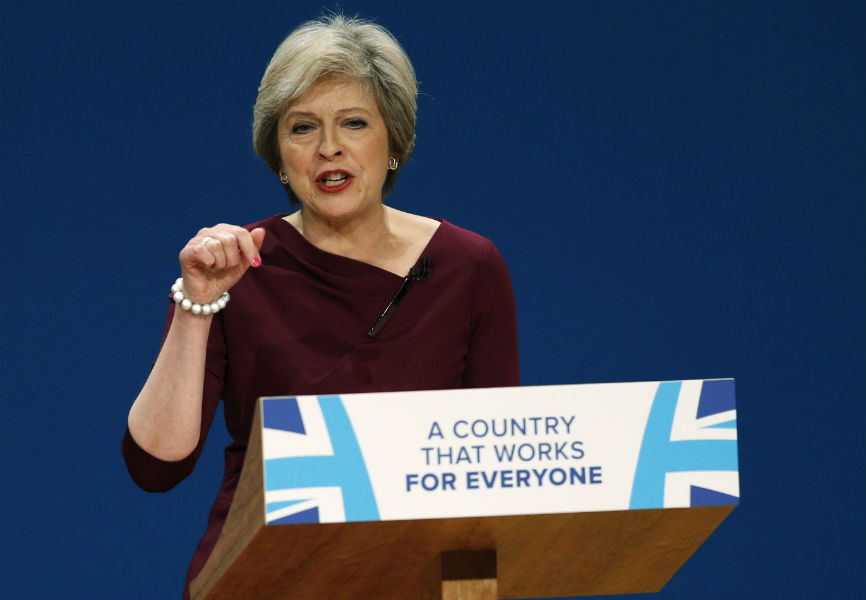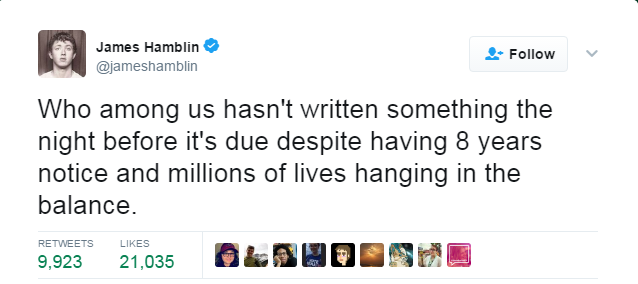

The odd interregnum between the U.K. deciding it wants to leave the EU and actually starting to do so is finally coming to an end as Theresa May prepares to activate the EU's Article 50 next week. In the nine months that David Cameron gifted to his predecessor by resigning, the U.K. has moved from massive uncertainty about its future role in the world to… slightly less uncertainty. The U.K. won't be a full member of the Single Market or the Customs Union, and it will have some kind of expanded trading relationship with the U.S. if Donald Trump has anything to say about it. But beyond that, just about everything is still up for grabs. May has used the period of Brexit-in-theory to prepare the government for Brexit-in-practice, but her bargaining position as one state on the outside of a club of 27 others and their supranational buddies hasn't changed since June. Nor has her lack of electoral mandate. However prepared she is, next week, Brexit will finally mean Brexit.


Meanwhile in Syria, a series of escalations between Israel and Syria illustrates the complicated position Russia has created for itself there. The chain started with an Israeli airstrike in Syria targeting Hezbollah. Although previous Israeli missions in Syria have gone unimpeded, the Syrians tried to shoot down Israeli aircraft this time, prompting Israel to use its new Arrow missile defense system to intercept the Syrian missile. Bluster and bombast ensued on all sides. Syrian President Bashar Assad publicly asked for help from Russia, which summoned the Israeli ambassador in Moscow. Benjamin Netanyahu says he told Vladimir Putin Israel would continue to act unilaterally. What to make of this? Keep an eye on Israel's growing concern with Hezbollah. The Israelis are evidently willing to take serious risks, even interstate conflict, to counter what they perceive as a threat. While the chance that Russia would become involved militarily is low — they notably did not use their own Syria-based air defenses against Israel — politically, Putin remains at the center of the conflict. Just where he likes to be.
What makes a strongman? We asked Basharat Peer, author of “A Question of Order: India, Turkey and the Return of Strongmen”
When Prime Minister Modi was campaigning for the prime minister's job in India, he used a famous phrase: only a man with a 56-inch chest can solve the problems of this country. And there is invariably, like we saw Putin, you see that with Erdogan, you see that with Modi, these are men who bring a very physical aspect to their politics. There is this strong physical presence, the use of the voice, the booming oratory, and a then a disdain for the nitty gritty of liberal-democracy.
Watch our interview with Basharat Peer, and read his book.
Ranked: To Russia With Love
Moscow is the place to be these days, whether you're there to accept questionable cash like former U.S. National Security Adviser Michael Flynn or if you're just accidentally snubbing NATO allies, like current U.S. Secretary of State Rex Tillerson. But not every trip has made major headlines. Here are a few lower-profile visitors on the Russian guestbook.
1. Marine Le Pen. The French National Front leader and presidential candidate landed in Moscow today. She has declared Russian Putin “good for world peace,” and her party has received loans from Russian-backed banks. Le Pen was invited by Russian lawmakers for this trip, leaving open the question of whether she will meet Putin while she's there (She did, and we congratulate her.) If not, maybe she can grab a bite to eat in the ice cream parlor in the Kremlin, just like she did at Trump Tower in New York, when she did not see Trump.
2. Horst Seehofer. German Chancellor Angela Merkel has been largely responsible for holding the European line against Russia in the wake of its invasion of Ukraine. But one of her ostensible allies has been conducting a parallel diplomatic campaign. Horst Seehofer, a German politician who heads Merkel's sister party, the CSU, met with Putin in Moscow earlier this month, saying he doesn't “want to live in a world that covers each other with sanctions.”
3. Igor Dodon. The president of Moldova has been at odds with his country's own government about relations with Russia. Dodon, who holds what is primarily a symbolic position, has advocated scrapping his country's recent agreement with the EU in favor of tighter relations with Russia. That position is not official policy, however, leading a member of the government coalition to remaining that the country is sending “contradictory messages on foreign policy.” Dodon seems undeterred. Last week, he paid a visit to Putin, and brought along few dozen bottles of wine as a gift.
4. Khalifa Haftar. A renegade general has emerged as Moscow's favorite in Libya's power struggle. He has visited Moscow multiple times in the past year or so, and even stopped by Russia's lone aircraft carrier, the Admiral Kuznetsov, when it visited Libya in January. But the real sign that he was Moscow's favorite came last year, when he showed up to a meeting with Russian Foreign Minister Sergei Lavrov wearing a signature Russian fur hat.
Your Weekly Bremmer
Watch the World in 60 Seconds from Abu Dhabi.
Hard Numbers
$20 million in investor funds is being sought by North Korea to develop a cruise ship to bring tourists to North Korea's “world-renowned Mount Kumgang.” We're just going to go ahead and say it: this seems like a bad investment.
700 Venezuelan bakeries have been raided by agents from the National Superintendent of Fair Prices to ensure they are in compliance with official price controls. Two arrests were made for illegal brownie making.
$34 million was spent by Zimbabwe on President Robert Mugabe's travel in the first 10 months of 2016. That exceeds the costs of the nation's ministries of transport and infrastructure development during the same period.
One-third of South Korean heirs to the nation's large business conglomerates, so-called chaebols, marry within their own ranks.
$147.79 was spent by Canadian diplomats on the rush order delivery of a cardboard cutout of Prime Minister Justin Trudeau. #WorthIt
13 new members are set to join the China-led Asian Infrastructure Bank, the first since the institution's creation in 2015.
“I didn't want this job. I didn't seek this job…
My wife told me I'm supposed to do this.”
– U.S. Secretary of State Rex Tillerson shows us what it looks like to take humility one step too far.
Signal is written by Matt Peterson (@mattbpete) with editorial support from Gabe Lipton (@gflipton). Don't like what you read? Feel free to yell at us on Twitter.